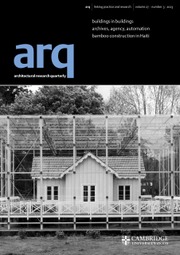Article contents
Urban catalysts in theory and practice
Published online by Cambridge University Press: 19 February 2010
Extract
This paper involves an analysis of the role of architectural projects which can be defined as ‘catalysts’ to urban renewal. The aims of this paper are twofold and the paper is divided accordingly into two main parts. The first aim is to discuss, with reference to the work of a number of urban and architectural thinkers, a range of ways in which the term ‘urban catalyst’ has been both conceptualised and applied. Discussion is structured in relation to the Oxford English Dictionary's definition of a ‘catalyst’ in the field of chemistry as,
[a] substance that when present in small amounts increases the rate of a chemical reaction or process but which is chemically unchanged by the reaction; a catalytic agent. (A substance which similarly slows down a reaction is occas. called a negative catalyst.)
- Type
- urbanism
- Information
- Copyright
- Copyright © Cambridge University Press 2009
- 6
- Cited by


